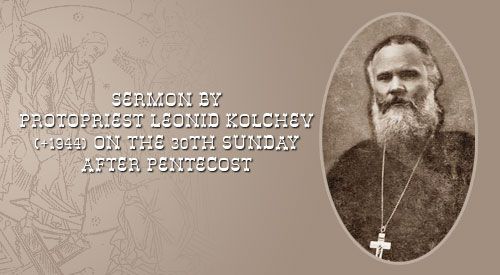
Gospel Reading from Luke, Pericope 91 (18:18-27)
After our fore-ancestors were no longer able to stand firm in goodness, having violated God�s commandment and lost the grace of Eden, they began to think about the possibility of returning their lost state of being. The Lord Himself gave them this hope, saying that the Descendant of woman will destroy the power of the devil over mankind. Faith in this Descendant was expressed by Eve as soon as her first son was born, whom she named Cain, which means �acquirer.� She likely thought that this was the promised redeemer, but the unfortunate parents soon saw that Cain was not to save them. So the years passed, decades, hundreds, thousands of years. Faith in the promised Savior was preserved, but that concept became so distorted that when the Redeemer, Christ, finally came, many did not recognize Him as such. In any case, even those who did not wish to accept that He was the Savior felt that this was no ordinary teacher (John 7:46), and that His deeds no doubt revealed Him to be a Great Prophet (Luke 7:16).
And so people strove to see Him, some to listen to His teachings, others to be healed from their various ailments and sicknesses, others to test him: would He say anything against the law, so that they could later denounce Him before the people and undermine His authority? But there were also those who wished to hear Him explain questions of the highest order. And so in today�s Gospel reading we hear that one wealthy and renowned young man asks Christ �Good Master, what good thing shall I do, that I may have eternal life?� So here it is, the age-old question of salvation, that if, of the return of the wasted blessedness, the question of the life to come, the question which troubled our first ancestors. It is apparent that the youth viewed the earthly life as a preparation for the heavenly life, which he properly called eternal. �Keep the commandments,� replied Christ and then pointed out some of them, specifically those that are based on love for one�s neighbor, omitting the commandments of love for God, likely because those who have no love for their neighbor cannot love God (1 John 4:20).
Jesus Christ thus briefly and clearly pointed to the possibility of Salvation. One must observe the laws of God, which are like guideposts to the path leading to the holy city of the Heavenly Jerusalem. �He that hath my commandments, and keepeth them, he it is that loveth me: and he that loveth me shall be loved of my Father, and I will love him, and will manifest myself to him� (John 14:21).
Jesus Christ�s response to the wealthy youth should be applied to us, brethren. The Church of God, as a loving mother, tells all who yearn for salvation: obey the commandments. Of course, this path is not easy, but if the youth in the Gospel was able to fulfill all the commandments, how much easier is it for us, for we have the aid of the grace of the Holy Spirit, which he did not have. �The things which are impossible with men,� said the Lord, �are possible with God.� And we tread this thorny path, sometimes rising from the very abyss of sin, despite all obstacles, and some of us have already completed their earthly voyage and now shine like the sun in the Kingdom of our Heavenly Father. It is difficult but not impossible, because as the Holy Apostle Paul encouraged us by saying: �I can do all things through Christ which strengtheneth me� (Philippians 4:13).
And so you, too, Christian, turn your attention away from daily life and all worries upon the commandments of God, and they will point to the path which leads to the place where each and every one of us wants to be. Every single one of us will reach the end of this earthly life, but bliss only awaits those who with God�s help tried to fulfill the commandments, only they will die with the hope of returning that which was lost and be once again with their fore-ancestors in the Kingdom of Heaven. Amen.
|